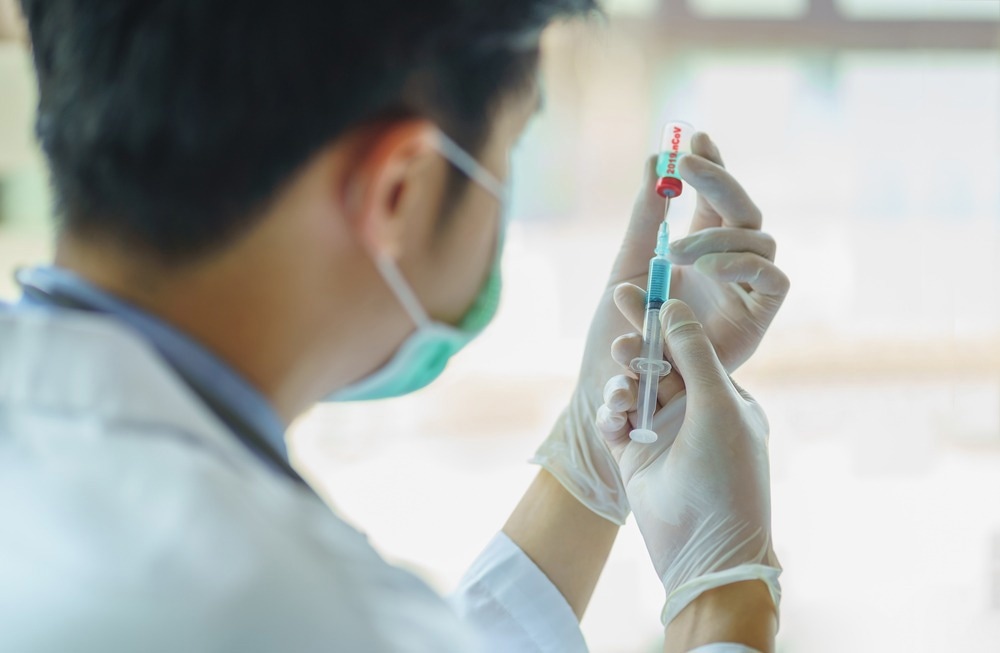The outbreak of the severe acute respiratory syndrome coronavirus 2 (SARS-CoV-2) was first reported in 2019 in Wuhan, China. The subsequent global transmission of SARS-CoV-2 ultimately led to the coronavirus disease 2019 (COVID-19) pandemic.
Implementing strict prevention measures and quarantine policies rapidly decreased COVID-19 cases in China. Despite these efforts, several localized COVID-19 outbreaks have still been reported.
 Study: Real-world effectiveness and protection of SARS-CoV-2 vaccine among patients hospitalized for COVID-19 in Xi'an, China, December 8, 2021, to January 20, 2022: A retrospective study. Image Credit: Take Photo / Shutterstock.com
Study: Real-world effectiveness and protection of SARS-CoV-2 vaccine among patients hospitalized for COVID-19 in Xi'an, China, December 8, 2021, to January 20, 2022: A retrospective study. Image Credit: Take Photo / Shutterstock.com
Background
The first local confirmed COVID-19 case in Xi’an was reported on December 8, 2021. Soon after, whole genomic sequencing was conducted on nasal samples collected from patients in this region. This analysis revealed that all patients were infected with the SARS-CoV-2 Delta variant.
The enforcement of widespread prevention measures temporarily reduced new COVID-19 cases in Xi’an to zero until January 20, 2022. Thereafter, a total of 2,050 confirmed COVID-19 cases were reported, thus making it one of the most severe outbreaks since Wuhan, China.
A large number of cases not only increases the transmission rate but also enhances the potential for SARS-CoV-2 to mutate. These mutations lead to the emergence of more virulent variants, which might have the potential to cause epidemics on a larger scale.
The SARS-CoV-2 Delta variant, which was first reported in India, contained nine amino acid site mutations in the spike protein. This enhanced the infectivity, pathogenicity, and immune escape capacity of this variant. As compared to the ancestral SARS-CoV-2 strain, the reproductive number of the Delta variant was also much higher.
Several vaccines, such as the Pfizer messenger ribonucleic acid (mRNA) vaccine and Sinovac inactivated vaccine, have received approval from global regulatory bodies. Previous studies have shown that complete vaccination against COVID-19 can induce substantial immunity against SARS-CoV-2 in most individuals.
Certain SARS-CoV-2 variants, such as Delta, are associated with reduced efficacy against available vaccines. Nevertheless, most COVID-19 vaccines are still effective in protecting immunized people against mortality, hospitalization, and severe infection.
Notably, the majority of Xi’an residents were vaccinated with two or three doses of COVID-19 vaccines during the aforementioned epidemic period. Only a few unvaccinated people were present in this region.
A recent Frontiers in Immunology study aimed to determine the real-world effectiveness of COVID-19 vaccines against SARS-CoV-2 infection based on the Xi’an population.
About the study
The current retrospective study included 231 COVID-19 patients who were hospitalized in Xi’an Chest Hospital between December 8, 2021, and January 20, 2022. The median age of the cohort was 37 years.
All participants were classified as mild, moderate, and severely infected and were also grouped based on vaccination doses. All relevant laboratory data, including coagulative function tests, lymphocyte subtypes, antigen-specific immunoglobulin G (IgG) and IgM levels, as well as demographic information, were obtained.
Many of the participants reported comorbidities such as hypertension, cardiovascular disease, diabetes, cerebrovascular disease, chronic liver disease, and chronic obstructive pulmonary disease.
The study participants received different types of vaccines, including those produced by China National Biotec Group Company Limited (CNBG) and Sinovac Biotech Ltd, as well as recombinant antigen protein vaccines manufactured by Anhui Zhifei Longcom Biopharmaceutical.
Study findings
Over 9% of the study cohort was unvaccinated, whereas 68.4% received two vaccine doses and 22.5% received three vaccine doses. Two and three vaccine doses significantly elevated IgG levels in the serum of COVID-19 patients. As compared to the unvaccinated group, the two- and three-dose vaccinated groups exhibited higher IgG levels against SARS-CoV-2.
Importantly, vaccination significantly reduced activated partial thromboplastin time (APTT) and thrombin time (TT). However, no change in the prothrombin time (PT) value was found.
Thromboembolism has been previously determined as a key factor that influences poor prognosis and death related to SARS-CoV-2 infection. In the current study cohort, vaccination effectively prevented the incidence of abnormal coagulation and protected against embolic complications.
The study findings are in line with previous reports indicating that eosinophil levels were significantly higher in vaccinated patients as compared to unvaccinated individuals. Comparatively, monocyte levels were low, which could be due to the protective effect of the vaccine on cytokine storms that are frequently observed in severely infected patients.
Typically, a decline in lymphocytes, particularly CD8+ T-cells, could be a predictor of COVID-19 severity and clinical worsening. Interestingly, vaccinated COVID-19 patients had significantly increased levels of CD8+ lymphocytes as compared to unvaccinated patients. No significant difference in CD8+ lymphocyte levels was observed in individuals who received two or three doses of the vaccine.
The incidence of hyponatremia was mostly prevented in the vaccinated group due to higher plasma sodium levels as compared to the unvaccinated group.
Study limitations
A key limitation of the current study was the small size cohort that was obtained from a single center. The time of the last dose of vaccination was not available for all participants, thus limiting the researchers’ ability to determine the association between vaccination-infection interval and disease severity.
Journal reference:
- Xiaowei, L., Xu, Y., Li, X., et al. (2022). Real-world effectiveness and protection of SARS-CoV-2 vaccine among patients hospitalized for COVID-19 in Xi'an, China, December 8, 2021, to January 20, 2022: A retrospective study. Frontiers in Immunology 23. doi: 10.3389/fimmu.2022.978977 https://www.frontiersin.org/articles/10.3389/fimmu.2022.978977/full